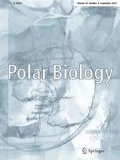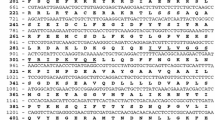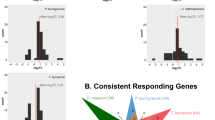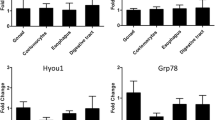Abstract
Previous research on Antarctic notothenioid fishes demonstrated the loss of the heat-shock response characterized by the rapid synthesis of molecular chaperones in response to increasing pools of damaged proteins. We determined that this loss was the result of constitutive expression of the inducible hsp70 gene. In this study, we examined the extent of this unique expression pattern in Antarctic fish by comparing the expression of two genes, the constitutive hsc71 gene and the inducible hsp70 gene, in tissues from Trematomus bernacchii to expression in tissues of Pagothenia borchgrevinki, a second Antarctic notothenioid, and Lycodichthys dearborni, a phylogenetically distant Antarctic species. Our study indicated that the expression of hsc71 is similar in all species; however, the constitutive expression of the inducible hsp70 gene was also manifested in these species. These data further suggest that cold denaturation of proteins at ecologically relevant temperatures may be contributing to this change in expression of the hsp70 gene.





Similar content being viewed by others
References
Ali KS, Dorgai L, Abraham M, Hermesz E (2003) Tissue- and stressor-specific differential expression of two hsc70 genes in carp. Biochem Biophys Res Commun 307:503–509
Ananthan J, Goldberg AL, Voellmy R (1986) Abnormal proteins serve as eukaryotic stress signals and trigger the activation of heat-shock genes. Science 232:522–524
Buckley BA, Place SP, Hofmann GE (2004) Regulation of heat shock genes in isolated hepatocytes from an Antarctic fish, Trematomus bernacchii. J Exp Biol 207:3649–3656
Carpenter CM, Hofmann GE (2000) Expression of 70 kDa heat shock proteins in Antarctic and New Zealand notothenioid fish. Comp Biochem Physiol A125:229–238
Chen LB, DeVries AL, Cheng CHC (1997) Convergent evolution of antifreeze glycoproteins in Antarctic notothenioid fish and Arctic cod. Proc Natl Acad Sci USA 94:3817–3822
Dettaï A, Lecointre G (2004) In search of notothenioid (Teleostei) relatives. Antarct Sci 16:71–85
Eastman JT (1993) Antarctic fish biology: evolution in a unique environment. Academic, San Diego
Fraser KPP, Clarke A, Peck LS (2002) Low-temperature metabolism: seasonal changes in protein synthesis and RNA dynamics in the Antarctic limpet Nacella concinna Strebel 1908. J Exp Biol 205:3077–3086
Goldberg AL (2003) Protein degradation and protection against misfolded or damaged proteins. Nature 426:895–899
Hardewig I, Van Dijk PLM, Moyes CD, Portner HO (1999) Temperature-dependent expression of cytochrome-c oxidase in Antarctic and temperate fish. Am J Physiol 277:R508–R516
Hofmann GE, Buckley BA, Airaksinen S, Keen JE, Somero GN (2000) Heat-shock protein expression is absent in the Antarctic fish Trematomus bernacchii (family Nototheniidae). J Exp Biol 203:2331–2339
Hunt BM, Hoefling K, Cheng CHC (2003) Annual warming in seawater temperatures in McMurdo Sound in relationship to endogenous ice in notothenioid fish. Antarct Sci 15:333–338
Kandror O, Brestschneider N, Kreydin E, Cavalieri D, Goldberg AL (2004) Yeast adapt to near-freezing temperatures by STRE/Msn2,4-dependent induction of trehalose synthesis and certain molecular chaperones. Mol Cell 13:771–781
Kunugi S, Tanaka N (2002) Cold denaturation of proteins under high pressure. Biochim Biophys Acta 1595:329–344
La Terza A, Papa G, Miceli C, Luporini P (2001) Divergence between two Antarctic species of the ciliate Euplotes, E. forcardi and E. nobilii, in the expression of heat-shock protein 70 genes. Mol Ecol 10:1061–1067
La Terza A, Miceli C, Luporini P (2004) The gene for the heat-shock protein 70 of Euplotes forcardii, an Antarctic psychrophilic ciliate. Antarct Sci 16:23–28
Laios E, Rebayka IM, Prody CA (1997) Characterization of cold-induced heat shock protein expression in neonatal rat cardiomyocytes. Mol Cell Biochem 173:153–159
Levine M, Tjian R (2003) Transcription regulation and animal diversity. Nature 424:147–151
Liu AYC, Bian HJ, Huang LE, Lee YK (1994) Transient cold shock induces the heat-shock response upon recovery at 37-degrees-c in human-cells. J Biol Chem 269:14768–14775
Lucassen M, Schmidt A, Eckerle LG, Portner HO (2003) Mitochondrial proliferation in the permanent vs. temporary cold: enzyme activities and mRNA levels in Antarctic and temperate zoarcid fish. Am J Physiol 285:R1410–R1420
Marques MI, Borreguero JM, Stanley HE, Dokholyan NV (2003) Possible mechanism for cold denaturation of proteins at high pressure. Phys Rev Lett 91:1381031–1381034
Near TJ (2004) Estimating divergence times of notothenioid fishes using a fossil-calibrated molecular clock. Antarct Sci 16:37–44
Place SP, Zippay ML, Hofmann GE (2004) Constitutive roles for inducible genes: evidence for the alteration in expression of the inducible hsp70 gene in Antarctic notothenioid fishes. Am J Physiol 287:R429–R436
Privalov PL (1990) Cold denaturation of proteins. Crit Rev Biochem Mol Biol 25:281–305
Santacruz H, Vriz S, Angelier N (1997) Molecular characterization of a heat shock cognate cDNA of zebrafish, hsc70, and developmental expression of the corresponding transcripts. Dev Gene 21:223–233
Somero GN, DeVries AL (1967) Temperature tolerance of some Antarctic fishes. Science 156:257–258
Sonna LA, Fujita J, Gaffin SL, Lilly CM (2002) Invited review: Effects of heat and cold stress on mammalian gene expression. J Appl Physiol 92:1725–1742
Stangl K, Gunther C, Frank T, Lorenz M, Meiners S, Ropke T, Stelter L, Moobed M, Baumann G, Kloetzel PM, Strangl V (2002) Inhibition of the ubiquitin-proteasome pathway induces differential heat-shock protein response in cardiomyocytes and renders early cardiac protection. Biochem Biophys Res Commun 291:542–549
Trinklein ND, Murray JI, Hartman SJ, Botstein D, Myers R (2004) The role of heat shock transcription factor 1 in the genome wide regulation of the mammalian heat shock response. Mol Biol Cell 15:1254–1261
Wickner S, Maurizi MR, Gottesman S (1999) Posttranslational quality control: folding, refolding, and degrading proteins. Science 286:1888–1893
Acknowledgements
We would like to thank the United States Antarctic Program (USAP) and Raytheon Polar Services Corporation (RPSC) for logistical and field support at McMurdo Station, Antarctica. This research was supported by the US National Science Foundation grant OPP-0301927 to GEH, and by Susan and Bruce Worster to GEH and SPP as the Worster Scholar and Worster Graduate Fellow, respectively, at the University of California, Santa Barbara. This research was conducted in accordance with US federal animal welfare laws via approval and oversight by the University of California, Santa Barbara Institutional Animal Care and Use Committee (IACUC) (Protocol no. 634). Specimens were collected in compliance with the US regulations governing collection of Antarctic organisms, the Antarctic Conservation Act of 1978 (Public Law 95–541), and the Antarctic Marine Living Resources Convention Act of 1984 (Public Law 98–623).
Author information
Authors and Affiliations
Corresponding author
Rights and permissions
About this article
Cite this article
Place, S.P., Hofmann, G.E. Constitutive expression of a stress-inducible heat shock protein gene, hsp70, in phylogenetically distant Antarctic fish. Polar Biol 28, 261–267 (2005). https://doi.org/10.1007/s00300-004-0697-y
Received:
Revised:
Accepted:
Published:
Issue Date:
DOI: https://doi.org/10.1007/s00300-004-0697-y




